The Milky Way galaxy is lighter than previously thought, according to new research published by British-based scientists on Wednesday.
The study led by the University of Edinburgh is the first time that scientists have been able to measure accurately the mass of the galaxy that contains our solar system, the researchers said.
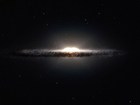 Full Story
Full Story
Far from being perfectly round, the Moon has a weird shape, with a highland bulge on the side facing the Earth and another bulge on its far side -- a riddle that has fascinated scientists for decades.
In theory, the Moon should be a nice sphere, sculpted by rotational forces since its creation some 4.4 billion years ago.
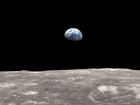 Full Story
Full Story
An Ariane 5 ES heavy rocket lifted off from South America late Tuesday bearing Europe's fifth and final robot supply ship for the International Space Station (ISS), mission control said.
The rocket rose from the launch pad at the European Space Agency's base in Kourou, French Guiana at 8:47 pm (2347 GMT) with a payload of more than 20 tons, the biggest in ESA's history, it said.
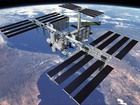 Full Story
Full Story
A billion-dollar telescope designed to provide the most detailed map yet of the Milky Way is ready to start work after teething problems, the European Space Agency (ESA) said on Tuesday.
"Following extensive in-orbit commissioning and several unexpected challenges... Gaia is now ready to begin its science mission," the agency said.
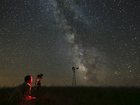 Full Story
Full Story
Japan announced Tuesday that it had wrapped up a whale hunt in the Pacific, the second campaign since the U.N.'s top court ordered Tokyo to halt a separate slaughter in the Antarctic.
The country's fisheries agency said 115 whales were killed during the two-and-a-half month campaign as the whaling fleet returned home.
 Full Story
Full Story
Efforts to save the tiger are being undermined by a lack of information about how many of the endangered cats live in the wild, the conservation group WWF said on Tuesday.
In 2010, a "tiger summit" in St. Petersburg, Russia, set the goal of doubling the number of wild tigers by 2022, against a baseline population believed at the time to be as few as 3,200.
 Full Story
Full Story
The U.S. space agency's Opportunity rover has now clocked more miles on Mars than any man-made vehicle to reach another celestial body, NASA said Monday.
Since arriving on the Red Planet in 2004, the solar-powered robot has journeyed across 25 miles (40 kilometers) of Martian terrain.
 Full Story
Full Story
One of Germany's newest coal-fired power plants rises here from the banks of a 100-year-old canal that once shipped coal mined from the Ruhr Valley to the world.
Now the coal comes the other way.
 Full Story
Full Story
A German chemistry professor started on Monday a grueling four-week solo swim down the Rhine river for the benefit of science and the environment.
Self-confessed "mad professor" Andreas Fath, who set off on his 1,231-kilometer (764-mile) adventure with a splash into Switzerland's Lake Toma, plans to swim through Germany and France to reach the river's mouth at the Dutch port of Rotterdam on August 24.
 Full Story
Full Story
The world's largest solar boat, the catamaran PlanetSolar, will embark on a Greek mission to find one of the oldest sites inhabited by man in Europe, an organizer said Monday.
Starting on August 11, a team of Swiss and Greek scientists will seek a "prehistoric countryside" in the southeastern Peloponnese peninsula, University of Geneva researcher Julien Beck told Agence France Presse.
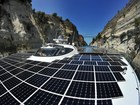 Full Story
Full Story



